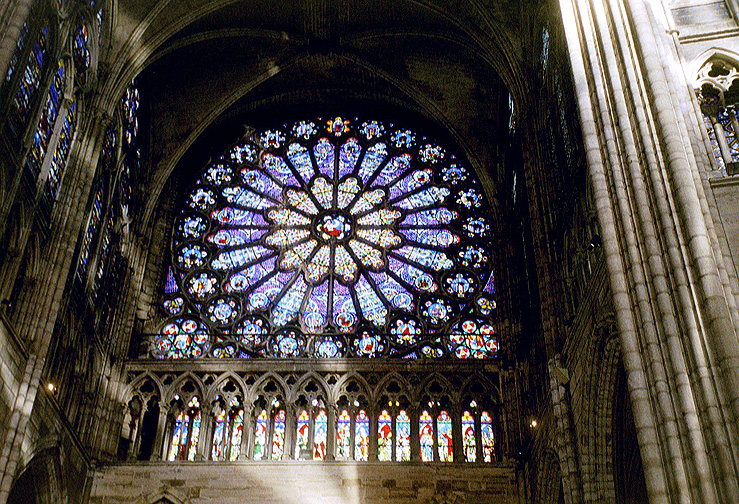
I have run across references to
roses several times in the last
few weeks. Three of the references
came to me in the last few days:
1) A reference in Judith Heartsong's
journal and 2) A link sent to me by
someone who reads my journal but who
does not know me. Nor does this person
presently post to my journal frequently.
Thus, the person has no knowledge of my
interest in roses or rose imagery. The
link was to an e.e. cummings poem and
3) A random search for something else
brought up William Blake's poem,
"The Sick Rose, which
I hadn't read in years.
Why this is relevant: This month,
a short story of mine is published in
The Sun. It is called "Rose's." The
story is about two young teenage girls
who have a bad encounter with two men,
leading to a reassessment of their
attitudes about their bodies, their
sexuality, themselves. The story
is called "Rose's" for the store the
girls like to visit, but symbolically,
the rose emphasizes the girls' budding
sexuality:
From The Woman's Dictionary of Symbols
and Sacred Objects by Barbara G. Walker:
ROSE WINDOW
The rose window of a Christian cathedral typically
faced west, the direction of the Goddess's paradise
in ancient pagan tradition: that mysterious sunset
land that medieval mystics converted into the land
of faery, ruled by its divine queen. The Gothic
cathedral opposed this primordial female symbol
in the west to its male symbol (cross) in the east,
that is, in the apse. Christian congregations turned
their backs on the great female rose, yet they were
bathed in her multicolored light. A rose window was
generally dedicated to the Virgin Queen of Heaven,
and the whole cathedral was described as her "palace."
The rose window was essentially a female-symbolic
mandala, expressive of the spirit of Mary as mystic
rose, Wreath of Roses, Mother of the Rosary, or Queen
of the Most Holy Rose-Garden.
Roses, rosaries, and rose-shaped mandalas had represented
the ancient Goddess in Oriental countries from time
immemorial. Her Rose-Apple Tree in the western paradise
had been the sourceof the fruit of eternal life from India
to Ireland in the oldest myths. Worshipers of Aphrodite
used to call their ceremones the Mysteries of the Rose.
Even medieval churchmen understood that the rose
was a female sexual symbol expressing the mystery
of Mary's physical gateway, source of the Redeemer's life.
~~~~~~~~~~~~~~~~~~~~~~~~~~~~~~~~
Here is Blake's poem, "The Sick
Rose." The poem is never mentioned
in "Rose's"; however, I think this
poem describes the girls' dilemma well;
that is, the fact that their innocence,
their confidence in themselves as
sexual beings has been violated:
"The Sick Rose," William Blake
O Rose, thou art sick!
The invisible worm
That flies in the night,
In the howling storm,
Has found out thy bed
Of crimson joy:
And his dark secret love
Does thy life destroy.
~~~~~~~~~~~~~~~~~~~~~~~~~~~~~~~
That brings me to the e.e.cummings
poem, which illustrates the beauty
and the power of the feminine in a
most intriguing way:
"somewhere i have never travelled, gladly beyond," e.e. cummings
somewhere i have never travelled, gladly beyond
any experience,your eyes have their silence:
in your most frail gesture are things which enclose me,
or which i cannot touch because they are too near
your slightest look will easily unclose me
though i have closed myself as fingers,
you open always petal by petal myself as Spring opens
(touching skilfully,mysteriously)her first rose
or if your wish be to close me, i and
my life will shut very beautifully ,suddenly,
as when the heart of this flower imagines
the snow carefully everywhere descending;
nothing which we are to perceive in this world equals
the power of your intense fragility:whose texture
compels me with the color of its countries,
rendering death and forever with each breathing
(i do not know what it is about you that closes
and opens;only something in me understands
the voice of your eyes is deeper than all roses)
nobody, not even the rain, has such small hands
~~~~~~~~~~~~~~~~~~~~~~~~~~~~~~~~
This poem seems to me a powerful
evocation of female power. It is
the kind of power the narrator of
the story clearly thinks she has
lost. The poem is sensual, spiritual,
and profound.
I'm a believer in meaningful
coincidences, and I believe this
pile up of rose imagery is an
occurrence of a meaningful coincidence.
I felt that not to do an entry on it
would be to deny some mysterious
power in the universe at work in my life.










